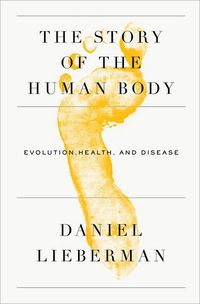

Purchase
Evolution, Health, and Disease
Pantheon
October 2013
On Sale: October 1, 2013
464 pages
ISBN: 0307379418
EAN: 9780307379412
Kindle: B00C8S9VCK
Hardcover / e-Book
Add to Wish List
Non-Fiction
A landmark book of popular science—a lucid, engaging account
of how the human body evolved over millions of years and of
how increasingly the disparity between the evolutionary
design of our "hunter-gatherer" bodies and the world in
which we live has occasioned a crisis of
"dysevolution."
In a book that illuminates, as
never before, the evolutionary story of the human body,
Daniel Lieberman deftly examines the five major
transformations which contributed key adaptations to the
body: the advent of bipedalism; the shift to a non-fruit
based diet; the rise of hunting and gathering and of the
species as comprised of superlative endurance athletes; the
development of a very large brain; and the incipience of
modern cultural abilities. He elucidates the difference
between biological and cultural evolution, the latter of
which, though largely beneficial, has created conditions to
which our bodies are not entirely adapted (resulting in a
growing incidence of new but avoidable diseases, including
diabetes and obesity). He accounts for "dysevolution," the
pernicious dynamic whereby only the symptoms rather than the
causes of these maladies are treated, and
finally—provocatively—he advocates the use of evolutionary
information to replicate, sometimes coercively, a more
salubrious environment.
Comments
No comments posted.
Registered users may leave comments.
Log in or register now!
| 


 © 2003-2025 off-the-edge.net
all rights reserved Privacy Policy
© 2003-2025 off-the-edge.net
all rights reserved Privacy Policy